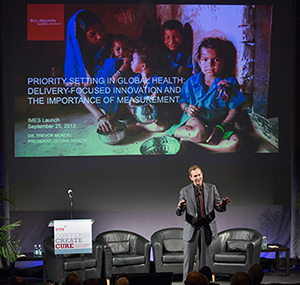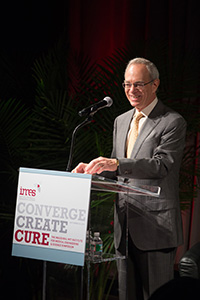Medical Engineering to Tackle Child Mortality, HIV/AIDS
-
-
slice.mit.edu
- 1
Filed Under
Recommended

The intersection of science, medicine, and data informatics will likely be the source of future medical engineering breakthroughs, according to the doctors, researchers, and scientists at MIT’s Institute for Medical Engineering & Science (IMES) inaugural symposium, held during the fall semester. “Be bold, think big, and save the world,” President Rafael Reif told participants who are tackling new treatments for child mortality, HIV/AIDS, and other diseases.
Speakers described substantial global challenges:
• Nearly half of the 6.6 million children under the age of five who die each year worldwide could be saved using existing medical treatments.
• By 2050, worldwide reported cases of Alzheimer’s are estimated to nearly triple to 277 million.
• Only half of the 33 million people living with HIV have received treatment.
Costs are also a critical issue. In the US alone, national health expenditures account for nearly 18 percent of GDP in 2011, according to the Center for Medicare and Medicaid Services, and are nearly two and a half times that of other OECD countries. Costs are expected to rise as the nation—and much of the world—grapple with health care for an increasing elderly population.
Surprisingly, health care technologies are often part of the problem, because they further drive up costs. Emery Brown, IMES associate director, called for participants to innovate wisely by developing “frugal engineering” ideas.
 President Rafael Reif
President Rafael Reif
In third-world countries, medical innovations not only need to be frugal, but sometimes they even need to be more technologically advanced than those in the developed world. “All too often products are not good enough for the countries where they need to be deployed,” said Trevor Mundel, president of the Bill and Melinda Gates Foundation’s Global Health Program.
For example, vaccines must be made to withstand high temperatures for years in storage because refrigeration is not always an option for third-world clinics. Clinicians also need real-time tools for diagnosis to so contagious patients will not be sent home to infect their communities.
The symposium, which can be viewed online, was part of MIT’s broader initiative to improve global healthcare. IMES will house the interdisciplinary MIT-Harvard Health Sciences and Technology graduate program and build partnerships with MIT scientists and engineers and doctors at Boston-area teaching hospitals.








Comments
Socialist Worker
Mon, 10/07/2013 2:45am
The way to solve the world's health care problems is to make a Socialist Revolution in the United States just like the workers and farmers in Cuba did over fifty years ago. The purpose of the US health care system is to make profits for large corporate insurance companies. It more like going to a casino then receiving compassionate care. Just like the casinos you put down your premium dollar and roll the dice in a game where the house is always guaranteed to win. The reason people in Africa, Asia, and Latin America don't get health care is because large US and European finance capital exploits the riches of these countries for private profit. People in these countries are turned into debt slaves who can never pay off the loans they must take to survive.
Bill Gates and President Reif know what I am saying is true. Gates wants to look good now that he is approaching his own EOL rather than go down as another ruthless American businessman and Reif has a Brooklyn Bridge called MIT to sell him.